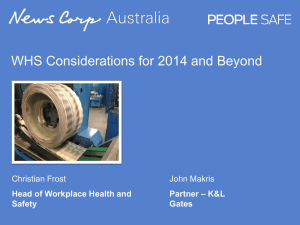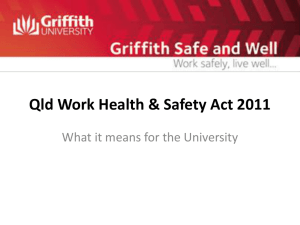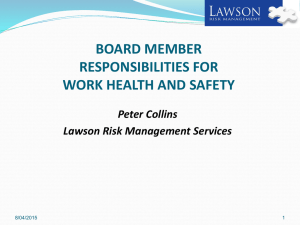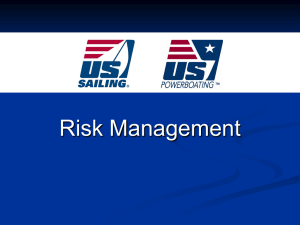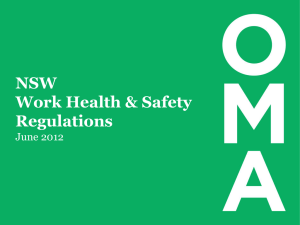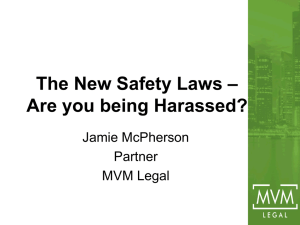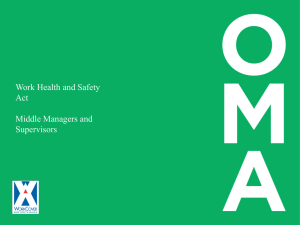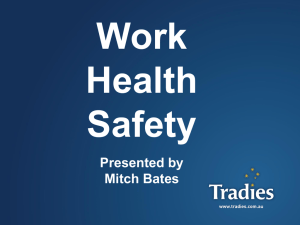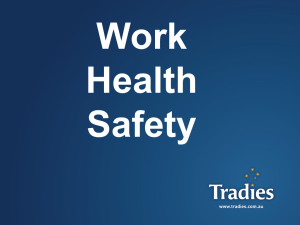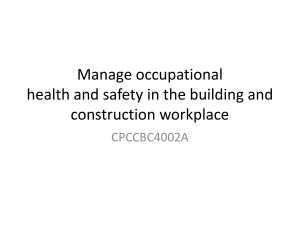Senior-Managers_New-OMA
advertisement
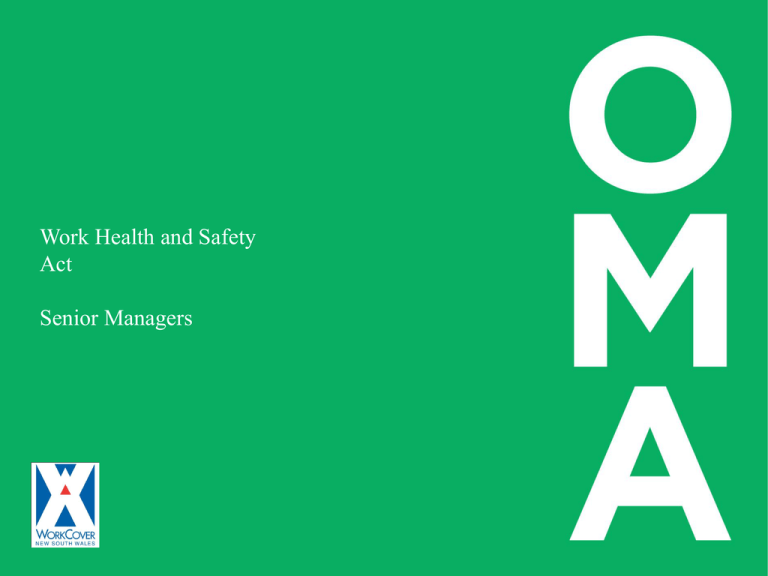
Work Health and Safety Act Senior Managers Senior Managers 01 What is new for NSW under the WHS Act? Summary An employer Is captured under the definition PCBU ‘person conducting a business or undertaking’ Controllers, self employed etc. Are also a PCBU with general duties of care General duties of Employers Will be subject to qualifier ‘reasonably practicable’ and will apply to all PCBUs and extend to all who are involved in the conduct of work Employees Are captured under the definition of worker which is broadly define to include anyone who carries out work in any capacity, including volunteers Summary Duty of workers Workers have an expressed duty to take reasonable care of themselves at work Duty of others Others are required to take reasonable care when at a place of work Duty of Officers Will change from having an attributed liability to a positive duty of “due diligence” to ensure PCBU complies with duties Due diligence Is specifically defined and includes knowledge of WHS and business risks , allocation of resources, WHS reporting, compliance and verification processes Consultation Broadened to include all workers affected and other PCBUs with shared responsibilities Summary OHS Representatives Replaced by health & safety representatives (HSR) with increased functions and powers HSR powers After completing approved training HSRs will be able to issue PINs and direct unsafe work to cease Management of Risk Risk assessments are not mandated in the Act but are mandated in the Regulation for certain high risk work Union officials Can apply for WHS entry permit to enter a workplace to advise on WHS or when a breach is suspected Summary Protection against discrimination Enhanced to protect workers and those in commercial arrangements from coercion, inducements or misrepresentation Onus of Proof Reverse onus removed with the prosecution having to prove a breach was committed Penalty Options Graduated enforcement options to include injunctions, remedial action and enforceable undertakings Penalties Maximum penalty for a corporation of $3 million and for an individual $300,000 & up to 5 years imprisonment for the most serious breaches New Terminology Employer Replaced by the term ‘person conducting a business or undertaking’ (PCBU) Controllers, self employed etc. Are also a PCBU with general duties of care Employees Replaced by the term worker which is broadly defined to include anyone who carries out work in any capacity, General duties of Employers Will be subject to qualifier ‘reasonably practicable’ and will apply to all PCBUs Duty of workers Workers have an expressed duty to take reasonable care of themselves at work New Terminology Directors and Manager Replaced with the term “Officer” as defined in the Corporations Act 2001 Duty of Officers Officers have positive duty of “due diligence” to ensure PCBU complies with duties OHS Representatives Replaced by health & safety representatives (HSR) with increased functions and powers OHS Committees Will be referred to as health and safety committees with effectively the same functions Union officials Can apply for WHS entry permit and will be know as WHS entry permit holders. New Terminology Workplace Defined to include any place where a worker goes, or is likely to be, while at work. Structure The provision of safe structures included in general duties of PCBUs and upstream duties of designers Definitions ‘Person conducting a business or undertaking’ A person conducts a business or undertaking: • whether the person conducts the business or undertaking alone or with others; and • whether or not the business or undertaking is conducted for profit or gain. A PCBU may be a partnership, an unincorporated association, a selfemployed person, a government agency. A person does not conduct a business or undertaking when: • the person is engaged solely as a worker in, or as an officer of, that business or undertaking• the person is acting in the capacity of an elected member of a local government authority • If the Regulation prescribes Definitions ‘Worker’ A person is a worker if the person carries out work in any capacity for a PCBU, including work as: • an employee • a contractor or subcontractor • an employee of a contractor or subcontractor • an employee of a labour hire company • an outworker • an apprentice or trainee • a student on work experience • a volunteer • a person of a prescribed class. The PCBU is also a worker if the PCBU is an individual who carries out work in the business or undertaking Definitions ‘Others’ Is taken to mean visitors, customers, members of the public etc. ‘A workplace’ A workplace is a place where work is carried out for a business or undertaking and includes any place where a worker goes, or is likely to be, while at work. 'Place' includes: • Offices, factories, warehouses, work vehicles, mobile advertising structure, billboards, bus shelters, phone booths and any other form of advertising structure. Definitions ‘Officer’ Means: • an officer within the meaning of s.9 of the Corporations Act 2001; other than a partner in a partnership; An officer may be: • A director or secretary of the corporation. • A person who makes, or participates in making, decisions that affect the whole, or a substantial part of the corporation. • A person who has the capacity to affect significantly the corporation's financial standing. Definitions Plant Includes: • any machinery, equipment, appliance, container, implement and tool; and • any component of any of those things; and • anything fitted or connected to any of those things. Structure Means anything that is constructed, whether fixed or moveable, temporary or permanent, and includes: • buildings, Billboards, bus shelters and indoor advertising signs • any component of a structure; and • part of a structure. Substance Means any natural or artificial substance, whether in the form of a solid, liquid, gas or vapour. Definitions ‘Designer’ Is a person who conducts a business or undertaking that designs: • plant that is to be used, or could reasonably be expected to be used, as, or at, a workplace; or • a substance that is to be used, or could reasonably be expected to be used, at a workplace; or • a structure that is to be used, or could reasonably be expected to be used, as, or at, a workplace. This includes billboards, bus shelters, phone booths and any other form of advertising structure. Definitions ‘Manufacturer’ Is a person who conducts a business or undertaking that manufactures: • plant that is to be used, or could reasonably be expected to be used as, or at a workplace; or • a substance that is to be used, or could reasonably be expected to be used, at a workplace; or • a structure that is to be used, or could reasonably be expected to be used as, or at a workplace. These include the fabricators that build billboards, bus shelters, phone booths and any other form of advertising structure. 02 NSW Work Health & Safety Act PCBU’s, the Primary Duty of Care & Other Duties What is a business or undertaking? Activities carried out by, or under the control of, a person a) Whether alone or with others b) Whether or not for profit or gain Including activities conducted by: a) A corporation, partnership, b) Unincorporated association c) Self employed person d) Government agency Who will be a PCBU? The primary duty is owed by the operator of the business or undertaking; Examples are: • Employers, Self employed, Partner, Franchisees , Franchisor PCBU • Principal Contractors, Sub-Contractors PCBU PCBU • Businesses who design, manufacture, import, supply plant, substances and structures used at work PCBU • Businesses who control workplaces, fixtures , fittings, plant at workplaces What WHS Act says PCBU’s must do: Primary duty of Care: A PCBU MUST so far as is reasonably practicable, ensure the health & safety of: Workers engaged, or caused to be engaged by the PCBU Workers whose activities are influenced or directed by the PCBU Other persons who could be put at risk from work carried out by PCBU Other PCBU Duties Primary Duty of Care plus 1. Consultation 2. Issue Resolution 3. Incident Notification 4. Complying with regulations Multiple PCBUs in respect of same activities Several PCBUs may owe a duty of care to the same people concurrently: • Each PCBU MUST comply with their duty, so far as is reasonably practicable • Each PCBU must discharge their duty to the extent that they can influence or control the matter Landlords & Site Owners Sign Installation Companies Advertising Companies Billboard Production Companies All duties are concurrent and non-transferrable Electrical Companies What are the major differences in the WHS Act? Major difference is the application of Primary Duty of Care NOW the primary duty of care does NOT rely on the employment relationship NOW the primary duty of care is OWED BY a PCBU. It is OWED TO workers carrying out work for PCBU NOW the primary duty of care is also owed by the PCBU to OTHER people affected by the work What are the major differences in the WHS Act? Major difference is the application of Primary Duty of Care NOW the specific duties that the PCBU has are more explicit and include the duty to monitor workplace NOW there is a greater chance that PCBUs will share duties for the same activities NOW the duty of care is qualified by the standard of what is reasonably practicable. 03 NSW Work Health & Safety Act Duties of Officers, Workers & Others OHS Amendment Act 2011 Recent amendments to the NSW OHS Act (The OHS Amendment Act 2011) have changed the provision of S26, effectively bringing forward the provision contained in the WHS Act which removes this attributed liability and introduces the positive duty of “Due Diligence”. This provision commenced in June 2011 WHS Act specifies Duty of Care on Officers One of the most significant changes introduced by the new Act • Introduces a “duty of care” on officers - the duty is to the PCBU • This is a positive duty allocated to officers in their own right • An officer may be found guilty of an offence whether or not the PCBU has been found guilty or convicted of an offence What WHS Act says about Officers Duties: Duty of Officers s27 “If a person conducting a business or undertaking has a duty or obligation under this Act, an officer of the person conducting the business or undertaking must exercise due diligence to ensure that the person conducting the business or undertaking complies with that duty or obligation” THIS DUTY CANNOT BE DELEGATED Officers must exercise Due Diligence What is Due Diligence? Audit & review WHS processes and use of resources Ensure WHS legal compliance Receive and consider business incidents, hazards & risks Acquire safety knowledge and keep up to date Due Diligence Understand business health & safety risks Provide resources to identify and control risks What are the major differences in the WHS Act? Major difference is the introduction of a POSITIVE duty of Due Diligence OFFICERS have a duty to ensure the entity acts appropriately & complies with WHS legislation NOW OFFICERS are defined and include internal and external persons of control and influence NOW DUE DILIGENCE is clearly defined and officers know exactly what they are expected to do What do you have to do? If you have existing systems to demonstrate management commitment and responsibility for WHS •review your systems in line with the legal elements of “due diligence” • make sure you have all elements covered and •make sure you can produce suitable records (evidence) to demonstrate compliance. What do you have to do? If you don’t have existing systems to demonstrate management commitment and responsibility •Identify who will have “officer” duties •Consider using the elements of “due diligence” to develop an officer Statement of Duty •Develop, implement, monitor, review WHS procedures and processes to include the active involvement of your officers •Provide training to officers to enable them to carry out these functions COMMENSURATE WITH SIZE & NATURE OF YOUR OPERATIONS Duties Must take reasonable care of own health & safety Must take reasonable care that conduct does not adversely affect others Must comply, so far as he/she is reasonably able, with instructions Must cooperate with reasonable notified policies and procedures Did the worker fail to take responsible care? The assessment of a worker’s failure to take reasonable care is made relative to the PCBU’s actions to do what was reasonably practicable: The systems of work in place at the time The training, information, instruction, supervision provided Whether the worker was working within their stated role Whether any other worker was placed at risk, and Whether the worker acted intentionally or recklessly What is the likely impact of these changes? Impact in relation to Duties of Workers •Makes responsibility to take care of own health & safety explicit •Extends to all workers –need to ensure employees as well as other workers are given the proper instruction and training about your policies and procedures and provided with adequate supervision •This will be a duty you may share with another PCBU What is the likely impact of these changes? Impact in relation to the Duty of Others •The new duty on others is about reasonable care NOT just recklessness •It may have the potential to apply to people who have been outside the jurisdiction of OHS Legislation – like home owners when work is being done, customers at shopping centre promotions or advertising displays, the public around billboards or bus shelters, rail platforms or other installation works etc. Differing standards according to the duty holder and the nature of the activity ACTIVITY DUTIES Primary Duty of Care Other duties STANDARD REASONABLY PRACTICABLE Specific duty holders PCBU Officers duty of care Leadership & Governance DUE DILIGENCE OFFICER Workers to take care of self and others Includes supervisory role REASONABLE CARE WORKER Other to take care of self and others Follow instructions OTHERS at workplace REASONABLE CARE Summary Officer must ensure the PCBU complies with its duties Officer’s duty discharged with due diligence This duty can not be delegated or transferred Workers to take care of themself & others at workplace Worker’s duty discharged with reasonable care Others at workplace to take care of themselves Other’s duty discharged with reasonable care 04 NSW Work Health & Safety Act Reasonably Practicable What is the difference in WHS Act in the use of reasonably practicable? • Current NSW OHS Act includes reasonably practicable as a defence in any proceedings against a person for an offence • Under the WHS Act the prosecution will have to prove the case thus abolishing the current reverse onus of proof situation • Under the WHS Act the obligations of the PCBU will be qualified by reasonably practicable rather than the current absolute duty in the NSW Act Overview of what WHS Act says about reasonably practicable The PCBU has a duty to ensure, so far as is reasonably practicable, the health & safety of workers that are: •engaged to carry out work for their business or undertaking- this includes engaging subcontractors and consultants •placed with another person to carry out work for that person, such as labour hire or •influenced or directed in carrying out their work activities by the person, while the workers are at work in the business or undertaking-Such as an advertising company officer directing an installation company worker to perform works onsite Reasonably Practicable: getting the balance Likelihood, degree of harm, knowledge etc Time, effort and cost to eliminate or reduce risk Reasonably practicable is the balance between risk and time, effort and cost Reasonably practicable: Getting the balance ? E.G little likelihood of risk occurring risk/minimal harm High level of time, effort and cost to eliminate or reduce risk Level of time, effort and cost way out of proportion with benefits in risk reduction Reasonably Practicable in the workplace • For common hazards such as electricity, falls and manual handling there are regulations that define what has to be done to control risks. These common hazards also have supporting codes of practice to provide guidance on how to control risks. • For more complex or workplace specific risks a risk management approach can be used to establish what is reasonably practicable • The most common decisions about reasonably practicable relate to the type of risk control to be used (the hierarchy of control). In other words what is the highest level of protection that is reasonably practicable. Reasonably Practicable: the Hierarchy of Control • The WHS Act advocates the highest level of protection as is reasonably practicable and the model regulations in many cases mandate a set of preferred controls consistent with the hierarchy of control- for example- the use of only PPE when working at heights a control in high risk situations may not be deemed as “reasonably practical” when other controls such as design and engineering are available • Consequently the level at which controls are applied is subject to decisions about reasonably practicable. Reasonably Practicable: the Hierarchy of Control ELIMINATE RISKS (so far as is reasonably practicable) STOP OR CHANGE THE ACTIVITY, PRACTICE OR PROCEDURE MOST RELIABLE Highest STOP USING OR CHANGE THE PRODUCT, PROCESS, PLANT OR SUBSTANCE MINIMISE RISKS (so far as is reasonably practicable) LEVEL OF PROTECTION SUBSTITUTE WITH SAFER ALTERNATIVE USE ENGINEERING CONTROLS REDESIGN TO REDUCE RISK ISOLATE PEOPLE FROM RISK Lowest USE PROTECTIVE CLOTHING / EQUIPMENT LEAST RELIABLE USE ADMINISTRATIVE PROCEDURES 10 NSW Work Health & Safety Act Enforcement What is different in WHS Act about Enforcement and Penalties? The WHS Act retains and builds on the enforcement framework found in the current legislation A greater range of sanctions, higher penalties, restrictions on a Trade Unions right to prosecute and abolition of the reverse onus of proof are new to the NSW enforcement framework Enforcement Measures The WHS Act provides graduated enforcement regime with civil and criminal prosecutions the ultimate sanction Injunctions, and enforceable undertaking are new in NSW Penalty Notice Enforceable Undertaking Injunctions Enforceable Undertakings WorkCover may accept a WHS undertaking in connection with the matter giving rise to a contravention or an alleged Penalty contravention as an alternative to a prosecution Notice Enforceable Undertaking $$ to focus on positive prevention action Injunctions NOT Available for Category 1 Offences Enforceable Undertakings • Once accepted no proceedings can be brought in relation to the contravention Penalty Notice • Giving an undertaking is not an admission of guilt Enforceable Undertaking Injunctions • Decision must be given in writing & notice of decision published on WorkCover’s website • Undertaking is enforceable when the decision to accept the undertaking is given • It is an offence to contravene – and can result in proceedings and/or an order to carry out The Right to Prosecute The right to bring a prosecution under the WHS Act rests with WorkCover in NSW Penalty Notice A Trade Union can bring a prosecution under the WHS Act in NSW only if: 1.the offence concerned is a Category 3 or, Enforceable Undertaking Injunctions 2.the offence concerned is a Category 1 or a Category 2 offence and WorkCover has (after referral of the matter to the Director of Public Prosecutions) declined to follow the advice of the DPP to bring the proceedings Power of HSR to issue PIN • Completed initial training • Consulted with the person to whom the notice is issued Can only act if Penalty Notice Enforceable Undertaking Then only if And • the representative reasonably believes that a person is contravening a Injunctions provision of the Act, has contravened a provision of the Act in circumstances that make it likely that the contravention will continue or be repeated • Must be in writing and may recommend measures to remedy issue • PCBU can seek review within 7 days. Inspector may cancel, confirm or confirm with modification Penalty Structure • Corporations: $3m Category 1 Reckless Conduct • Individuals as a PCBU or Officers of a PCBU: $600k / 5 years jail • Other Individuals : $300k / 5 years jail Penalty Notice Enforceable Undertaking Category 2 Breach High Risk Category 3 Duty Breach • Corporations: $1.5m • Individuals as a PCBU or Officers of a PCBU: $300k Injunctions • Other Individuals : $150k • Corporations: $500k • Individuals as a PCBU or Officers of a PCBU: $100k • Other Individuals : $50k
